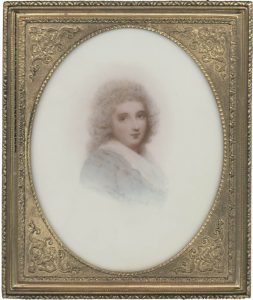by Gwen Fries, Adams Papers
Three days before her second birthday, Abigail Adams 2d, or “Nabby,” received the perfect birthday present—a little brother named John Quincy. As she remembered it, the love was instant, and history is on her side. The first mention of John Quincy Adams in the Adams Family Papers is an account given by Abigail of a two-year-old Nabby rocking a two-month-old JQA to sleep, singing, “Come pappa come home to Brother Johnny.”
During the next decade the siblings lost two little sisters, gained two brothers, and lost their father to the Continental Congress in Philadelphia. Yet, in the midst of revolution and war, they still found time to be children—trading books, going fishing and ice skating, taking long walks, and gossiping about their cousins. Then in February 1778 their father was sent to Paris, and he decided to take ten-year-old John Quincy with him.
Over the next six years, Nabby felt the loss of John Quincy’s company severely. Nabby wrote to her brother, “I cannot bear the idea of growing into life strangers to each other,” adding, “Indeed, it sometimes seems to me as if you were lost.” To her cousin Elizabeth Cranch, Nabby admitted, “I do not talk upon the subject, but there is not a day passes over my Life but this subject occupys my thoughts, and disbelieve it if you please, I can seldom reflect upon it without tears.”

After years of waiting, Nabby and her mother set sail for London to reunite with John Quincy. On 30 July 1784, nineteen-year-old Nabby was in the middle of a letter to her cousin when she wrote, “This moment a servant tells me that my Brother has arrived and has stoped at the next house to dress. Why has he done this. He knowns not the impatience of his sister.” Abigail later related: “His sister he says he should have known in any part of the World,” and added, “Were I not their Mother, I would Say a likelier pair you will seldom see in a summers day.”
Less than a year later, JQA had to return to the United States to prepare for Harvard. Nabby lamented, “He is gone—alas to my sorrow—for I lost in him all the Companion that I had—and it is not possible his place should be supplyd.”
Determined to be “life strangers” no more, John Quincy and Nabby kept up their correspondence, writing uncommonly long letters to each other in which they covered all topics—particularly gossiping about the people with whom they came into contact, royalty included. Nabby and John Quincy shared a somewhat snarky sense of humor, and their letters were considered too candid even for John and Abigail’s eyes. Abigail wrote to her son, “Your Sister has written you so many pages that I suppose she has not left me any thing material to write to you but. . .I am very rarely honourd with a sight of any of them.”
Nabby told JQA of her daydream that she would settle in New York near her husband’s family “and have you one of these Days come as a Member from the Massachusetts to Congress. We should be quite at home again.”
A shifting capital dashed Nabby’s daydream, but John Quincy and Nabby never became strangers again. JQA was a devoted uncle to Nabby’s children, and Nabby nursed John Quincy’s wife through bouts of illness and difficult childbirths.
Their 46-year friendship confirmed Nabby’s prediction that she made in the same letter where she fretted they were becoming strangers: “There is no higher pleasure, no greater happiness, than a family bound by the ties of love, and cemented by the bonds of affection, where each for the other feels more than for himself, and where the chief end and aim is to render each other happy: this I wish may be our situation; it will; and the advantages arising will be mutual.”


Gwen, thank you again for bringing the sentimetal side of JQA to us. I love this. He must have had a special respect for his sister to have stopped next door to change his clothes.
Your a beacon of JQA for me. Thanks from the bottom of my heart. VP